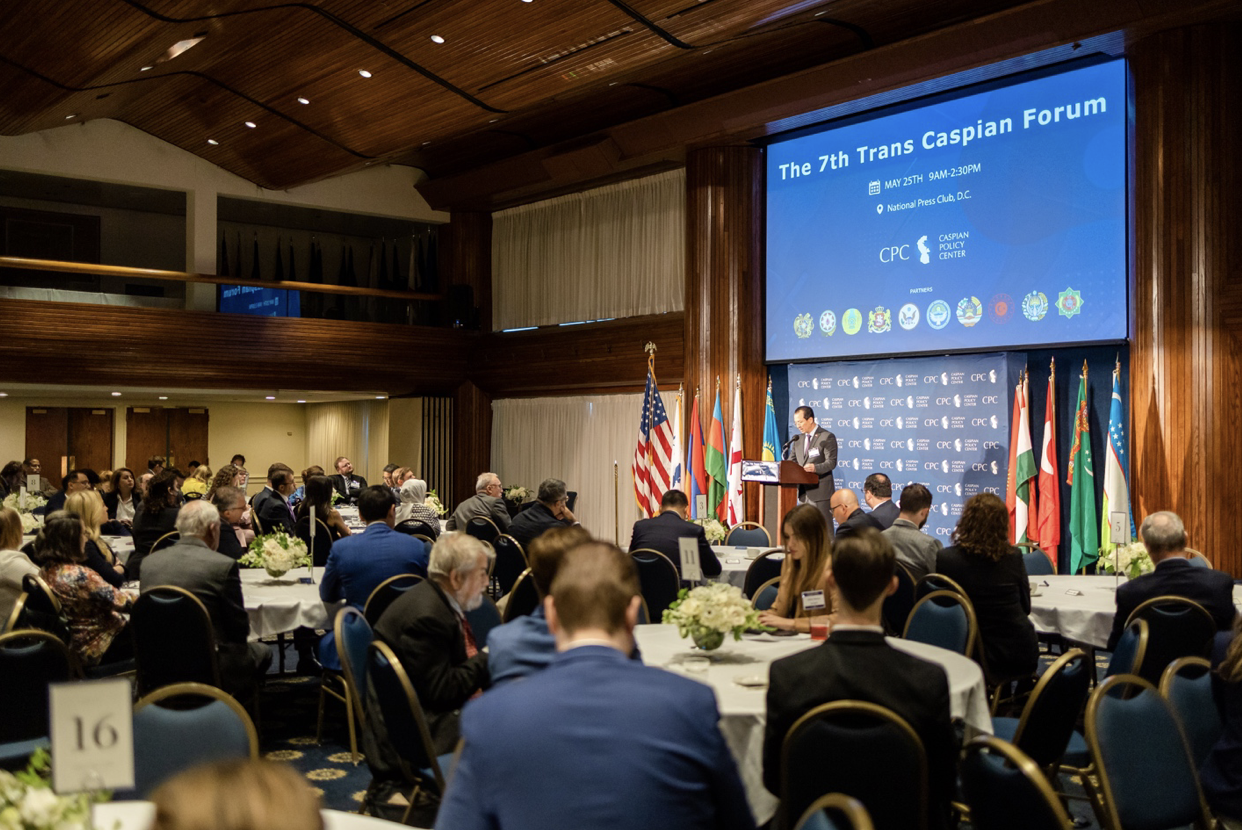Washington, DC is a city synonymous with both American History and modern political power. It is also the frequent host of international visitors, as countries around the world interact with the leadership of the United States. On May 25, Washington provided a fitting backdrop to a conference that explored a region of growing importance in the world and its relationship to world powers, including the U.S.

Photo credit: Caspian Policy Center.
The highly informative Trans-Caspian Forum was organized by the Caspian Policy Center. The conference gathered together the ambassadors of many Central Asian countries, as well as representatives from Azerbaijan, Türkiye, Georgia, and Armenia.

Assel Nussupova.
The forum focused on issues pertaining to the Central Asian republics which once formed part of the Soviet Union. Kazakhstan, the Kyrgyz Republic, Tajikistan, Turkmenistan, and Uzbekistan, since achieving independence 30 years ago, have received increased attention from world powers such as the United States, China, and Russia. The forum highlighted that matters such as energy cooperation, regional connectivity, stability and security issues, economic diversification, and environmental challenges are major areas of regional interest to Western nations.
The role of the United States in the region was one of the most discussed issues. Similar to comments made during the Caspian Policy Center’s recent forum on China’s Silk Road initiatives in Central Asia, many speakers underlined that the influence of the United States in the region seems to be waning, becoming secondary to that of China and to some extent, that of Russia.
This is due, in large part, to the geographical distance between the region and the United States. This remoteness keeps the United States from committing a large enough amount of resources for full economic engagement with the Central Asian states. It also limits how much the United States can get involved with upgrading the physical infrastructure of these countries. China and Russia are immediate neighbors to some Central Asian countries. China, in particular, shares borders with Kazakhstan, Kyrgyzstan, and Tajikistan. The accelerating economic engagement between China and its close neighbors in Central Asia is setting a new tone for the region.
It also calls for new approaches by the world’s superpowers to pursue diplomatic relations in this area. Efgan Nifti, the Caspian Policy Center CEO, observed, “With the presence of these countries in the region, it has become increasingly imperative for the United States to step up its presence to continue to support the independence, sovereignty, and territorial integrity of the states of the Caspian region.”
How does the United States plan to “step up its presence” in the region? What concrete measures can the USA offer? In the words of Brian Stimmler, the acting Deputy Assistant of the Secretary of State for Central Asia, “The U.S. vision for its relationship with Central Asia is not confined to ‘government to government’ interactions. Rather we believe that a healthy partnership with the region demands a multifaceted engagement across government, business, and civil society.”
According to Nicholas Berliner, the senior director for Russia and Central Asia at the National Security Council, “Times of change and uncertainty also create opportunities, and we see this moment as a time to strengthen our relations with this important region.” He emphasized that the U.S. will commit to “strengthening Central Asia’s economic independence” and help to diversify its economic partnerships and connect it to global markets. Along with energy, several other sectors also look potentially beneficial for future investment, including agriculture, environment, tourism, health and education.
Various speakers at the forum touched on the idea that Central Asia is a region with huge potential for providing renewable and clean energy. While the area continues to be a large fossil fuel producer, the future may see it growing as a source of alternative power.
Laura Lochman from the Bureau of Energy Resources in the U.S. Department of State, spoke specifically about Central Asia’s clean energy potential. In her statement, Lochman underlined that Central Asia is a landlocked region with access to global markets through Russia to the north, Iran to the south and China to the east. This presents tremendous opportunities. At the same time, the region faces huge geopolitical, economic, social and environmental challenges. It is obvious that energy diversification is extremely important to the region’s health and success, including meeting its climate goals. According to Lochman, “The United States is eager to work with Central Asian countries to accelerate methane reduction… through project finance, policy and regulatory strengthening, and other technical assistance.” And for the United States, “Building stable, reliable, and secure supply chains for critical minerals is critical to our energy transition and our engagement with Central Asia.” She also added: “We aim to address infrastructure needs in the Middle Corridor trade route, across the Caspian and through Azerbaijan into Europe, to better allow countries to export critical minerals to the global market.”
The U.S. engagement with the Caspian region was highlighted in a statement by Brian Stimmler, who emphasized the “extraordinary change taking place” in relations between the region and the US. He noted, “This past year has seen more high-level U.S engagement and centralization than at any other time in the last 30 years since these countries gained independence.” For example, in the words of Stimmler, “this year alone, the United States has devoted over $100 million in assistance and engaged in over 40 programs in the C5+1 format.” In addition, Secretary Blinken announced recently that there is a $45 million initiative coming to develop regional infrastructure in an effort to facilitate trade in the region and support its private sector.
Every year, Washington blooms with thousands of cherry blossoms. For the past 30 years, the five Central Asian countries have also been blooming – growing, changing and experiencing political, economic and social challenges. The world’s major economic powers have taken notice. They have recognized that the region presents huge business and investment opportunities for the West. The Trans-Caspian Forum thoughtfully engaged with the complex issues posed by the vitally important relationships amongst the Central Asian countries and the U.S., Russia and China. Only time will tell how these relationships will blossom and impact the key areas of growth and development in this fascinating and vibrant region of Central Asia.
The author is an analyst with a Master’s Degree in Economics from Georgetown University in Washington, DC, with more than 20 years of experience working for the Kazakh government. She focuses on macroeconomics, commodity, financial markets, and economic and social policies in Kazakhstan and globally.
